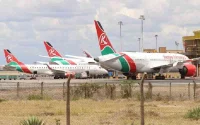By Kevin Mutiso
My grandmother passed away during the COVID 19 Pandemic. It was Easter Sunday. She was our matriarch. If it were normal times, we would have had a huge function in her honour.
But these were not normal times and she had to be buried within two days and only 15 people could attend. The silver lining, however, was that this small function necessitated the most intimate and important memories of my life and family.
During our meal, my father and uncles, her sons — she only had boys, began to reminisce. They shared some emotional stories and some hilarious ones, some so funny that for a brief moment we forgot we had come to bury our matriarch. One story, however, captured my imagination. It was the story of how my grandmother made decisions after her husband, my grandfather had passed away in 1969.
She was not as educated as he was, and she was a woman with five young sons. Her vision was to ensure that her children would go to university and prosper in their adulthood. She, therefore, made very critical decisions about her children and they lived in one of the strictest households that have ever been described to me. She was also the sole breadwinner and had to feed all five mouths and a worker who would look after these five sons when she worked during the day.
She was everything from a prison warder, a bar owner, farm owner, and eventually a small-scale commodities trader, as she would consolidate maize harvests in the village and hire a truck to sell to clients in arid areas in Kenya. She was industrious, hardworking, and very strategic. On this sad afternoon, I understood the concept of the 7th Generation.
The 7th generation is a concept from a Native American tribe known as the Iroquois (pronounced i — ruh — kwoy). When the Iroquois council of elders had to make a difficult and critical decision, they would invoke the concept of the 7th generation. This concept states that the current members of the council would represent an imagined member of their family seven generations into the future and would make decisions based on how it would impact that imagined member of the family.
My grandmother’s decisions freed me from poverty and gave me the privilege of pursuing entrepreneurship and in FinTech. Her decisions allowed me to travel the world in pursuit of knowledge and capital. She would laugh about my exploits and she would always give glory to God even when, like now, we are struggling as the economic impacts of the COVID-19 Pandemic make our economic endeavors uncertain.
I started to think about my own critical decisions — who my imagined family member, seven generations, from me would look like and what would the world be like? Seven generations from me are 90 years into the future. The year is 2110 and Independent Kenya is 147 years old. I started to think about all the data that was out there about me, what would they say about me and my generation, would we be the like the Lost Generation who, according to Wikipedia, are described as the social generation cohort that came of age during World War I.
“Lost” in this context refers to the “disoriented, wandering, directionless” spirit of the many war’s survivors in the early post-war period. Or would we be like the baby boomers who are considered the most successful generation of all time?
The COVID-19 Pandemic has changed the world forever and anyone who claims to be able to predict what will happen in the future is lying. However, we know some things now as fact. Some of the jobs and businesses that had to shut down will never come back and at the same time many businesses will thrive. We also know that there is an opportunity to shape our future in ways that were until this point unimaginable.
I would like to make a case for the Kenyan and African millennials to consider a name change. The African millennial is similar to their counterparts in western countries in many ways, but their context is extremely unique.
This generation grew up in a New Africa. An Africa that was now run by a second or third cohort of African leaders. The independence struggle was something they read in history books and were taught in class. In this Africa, indigenous Africans were getting wealthy.
Many who had moved from the village to the city, became wealthy and could now afford cars, nice houses, and other fancy things. What seemed to be the sure route to this kind of success, was education. A university degree in many African families is a sign of prestige. As a result, many African families aspired to take their children to university and the number of Kenyan university degree holders moved from a few hundred in the 1960s to over 500,000 today.
In addition to this, a cultural change was happening as a result of advances in technology. Radios became almost ubiquitous in urban households by the late 1980s and TVs by the mid-2000s. This African millennial was being exposed to urban western culture through musical genres like hip hop, sitcoms, magazines, and western sports culture.
As a result, this African millennial shares several cultural touchpoints with their western counterpart and a good example of this is the cult-like following of Premier League teams like Manchester United and Chelsea here in Kenya.
This generation has networks of relatives across the world due to the huge “brain drain” that happened in the 1980s and 1990s as a result of the massive emigration of educated Africans to different parts of the world seeking a better life for their families. This generation was raised by the post-colonial generation. The post-colonial generation were children of the pre-independence generation who fought for our freedom.
So what name should we give ourselves? By invoking the 7th generation concept, and as a representative of an imagined member of my family 90 years from today, I would like to propose the name Generation Hope.
Generation Hope because we should be remembered in history for being the generation that was optimistic about the future and did not let major setbacks like COVID 19 knock them out, but instead spurred them to think outside the box to ensure that the next normal was a better place for everyone.
The concept of the 7th generation makes decision making slightly more difficult because some of the solutions will be some of the toughest to implement, and some initiatives will take sacrifices just like my grandmother had to make for me and my family.
In addition to proposing a name, I would like to propose a goal for Generation Hope within my context. We should have many goals, but I am an entrepreneur and I want to represent the entrepreneur in my family 90 years from today. For them to be successful they will need a more efficient market for them to trade their goods or services. An efficient market has two characteristics; stability, and fairness. The rules should not be skewed to one player, and one should be able to plan their business far into the future.
In that regard, I would like to propose three simple metrics to gauge our progress. Economists use GDP per capita to compare the living standards of a person in a country and the Gini coefficient that measures the wage gap between the richest and the poorest earners in a country.
The Gini coefficient is a number always between 0 and 1. If the number is 0, then everyone in the country earns the same amount of money and is known as perfect equality and if the number is 1, only one person earns everything and is known as perfect inequality.
Kenya’s GDP per capita as of 2019 was Ksh170,000 (USD 1,700), which technically means that the average Kenyan has a standard of living equivalent to Ksh 14,166 (USD 141) per month and Kenya’s Gini coefficient is 0.42. For comparison’s sake, The USA’s GDP per capita is slightly over Ksh6 million (USD 60,000) and the average American has a living standard of about Ksh540,000 (USD 5,400) per month and USA’s Gini coefficient is 0.39. Kenya’s Gini co-efficient is ok but could be better and we should aspire to be closer to Sweden’s which is 0.27.
However, our GDP per capita is too low. We need to move it up to at least Ksh1.2 million (USD 12,000) so that the average standard of living is Ksh100,000 (USD 1,000) per month. China’s GDP per capita was Ksh100,000 (USD 1,000) in the year 2000. Today it is over Ksh1 million (USD 10,000). So this is not a monumental task, it has been done before.
We need a third metric. Unfortunately, I have not found a third metric that takes into consideration what the other two fail to capture; emotional, spiritual and mental wellbeing. If you have ideas, let us start sharing them. This metric should help us re-imagine our society for the better forever. This metric shall be part of Generation Hope’s legacy.
As Generation Hope enters its most economically productive years and as we move into higher levels within our areas of expertise, may we do our part and ensure that by 2040 we improve our GDP per capita to over 1.2 million shillings (USD 12,000) and improve our Gini coefficient to 0.25. May we set the example for future generations and teach them how to invoke the concept of the 7th generation when making the critical and important decisions of their time.
The last conversation I had with my grandmother was in late February this year when she had come for a check-up with her doctors. She was staying with my parents. My daughter and I went to pay them a visit. It was a warm day, so she was basking in the sun. I joined her. I said hello and she acknowledged my presence.
She did not ask how I did or ask me when I was going to get married as she usually did. This time she said, “Kevin, vumilia!” Which translated from Swahili means, “Kevin, persevere.” She then added how hard it had been for her when my grandfather had passed, she said, “Imagine being a single mother of 5 boys, one few months old in those days?” “Vumilia, itakuwa sawa!” “Persevere, it shall be alright!”
It shall not be easy, but if you are between the age of 25 and 40 in 2020, you are part of Generation Hope. As you make those critical decisions about your life and those of your children, invoke the concept of the 7th generation and make the best decision for that imagined member of your family and remember that whatever you do, it will move the average standard of living of your fellow Kenyan to Ksh100,000 (USD 1,000) a month. It will be difficult but as my grandmother proved: We gon be alright!
If you are part of Generation Hope, I urge you to do two things; firstly share this article with someone in a leadership position and let them know that you are willing to help solve some of the challenges because you will be a leader soon.
Secondly, stand up and be proud to be part of Generation Hope; The generation that came out of COVID-19 stronger and made their world a better place than they found it.
The Writer is an Entrepreneur and Chief Executive of Alternative Circle
See Also>>>> Survey: Millennials, Generation Zs Unsettled About The Future











Leave a comment